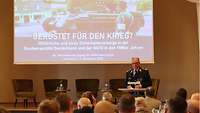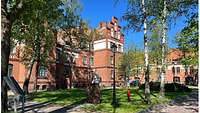




Den 80. Jahrestag des Kriegsendes 1945 nimmt das ZMSBwZentrum für Militärgeschichte und Sozialwissenschaften der Bundeswehr zum Anlass für eine gemeinsame Tagung mit dem Institute of Baltic Region History and Archaeology der Universität Klaipėda (Litauen). Die englischsprachige Veranstaltung mit dem Titel „The Year 1945: Experiences and Legacies in the Baltic Sea Region“ findet vom 8. bis 10. Oktober 2025 in Klaipėda statt.

Eine preußische Kaserne als Standort der Universität Klaipėda.
Bundeswehr/Jörg EchternkampAchtzig Jahre nach dem Ende des Zweiten Weltkriegs und der NSNationalsozialismus-Diktatur in Europa stellt sich angesichts der sicherheitspolitischen „Zeitenwende“ die Frage neu, welche Bedeutung dem 8. Mai 1945 beigemessen und wie ein Kriegsende erinnert werden soll, dem nicht überall ein Frieden in Freiheit folgte. Die Konferenz rückt dazu die Baltischen Staaten in den Fokus, die nach der deutschen Besatzung 1944/1945 unter sowjetische Herrschaft gerieten und von der politischen Landkarte der Nachkriegszeit weitgehend verschwanden. Von einem Ende der militärischen Gewalt konnte hier angesichts eines jahrelangen Partisanenkriegs keine Rede sein. Bis heute sind die politischen, sozialen und materiellen Folgen dieser Ära nicht zu übersehen. Während in anderen Teilen Europas die Idee der Befreiung von der Diktatur und die Ermöglichung der Demokratie die Narrative prägen, erzählen die baltischen Staaten eine andere Geschichte von „Kriegsende“ und „Nachkriegszeit“.
Die Konferenz wird diesen Geschichten auf drei Themenfeldern nachgehen:
Wurde das Jahr 1945 lange als Endpunkt der nationalsozialistischen Herrschaft in Europa betrachtet, soll es hier zum Ausgangspunkt einer historischen Entwicklung genommen werden, ohne die sich die gegenwärtige Situation der baltischen Staaten kaum verstehen lässt.
Wednesday 8 October 2025 | |
|---|---|
| 14:00 | Arrival and registration, coffee |
| 14:30 | Introduction and welcome address
Vasilijus Safronovas (Institute of Baltic Region History and Archaeology, Klaipėda University, Lithuania) & Jörg Echternkamp (Bundeswehr Center for Military History and Social Sciences, Potsdam, Germany): Introductory Remarks |
| 15:00 – 17:30 | First Panel: The Baltics in ‘Big Politics’ and Geostrategic Thought Chair: Vasilijus Safronovas (Institute of Baltic Region History and Archaeology, Klaipėda University, Lithuania)
Kevin Rowlands & Andrew Young (Royal Navy Strategic Studies Centre, London, United Kingdom): A Region Defined by the Sea Must Consider the Sea Jacek Tebinka (University of Gdańsk, Poland): The Baltic Sea in the Strategic Plans of Winston S. Churchill 1945 Ramojus Kraujelis (Vilnius University, Lithuania): Yalta Revisited: The Baltic Echoes of 1945 or Once again about ‘Big Three’ and Baltic Question in Yalta 1945 Magnus Ilmjärv (Tallinn University, Estonia): The Baltic Question 1944–45 |
| Reception | |
Thursday 9 October 2025 | |
|---|---|
| 09:00 – 11:00 | Second Panel: 1945: Expectations and Political Visions for the Postwar World Chair: Justas Stončius (Institute of Baltic Region History and Archaeology, Klaipėda University, Lithuania)
Paweł Jaworski (University of Wrocław, Poland): The Polish Government in Exile and the Discussion on the Future of the Baltic Sea at the end of the Second World War Toomas Hiio (Estonian War Museum – General Laidoner Museum, Viimsi/Tallinn, Estonia): The Year 1945 in Estonia: New Hopes, Loss of Hopes Vykintas Vaitkevičius (Institute of Baltic Region History and Archaeology, Klaipėda University, Lithuania): Strategy of the Anti-Soviet Resistance in Lithuania in 1944–1953 |
| 11:30 – 13:30 | Third Panel: Soviet Perspectives - Part I Chair: Jörg Echternkamp (Bundeswehr Center for Military History and Social Sciences, Potsdam, Germany)
Kristo Nurmis (Tallinn University, Estonia): “We Must Scrub, Scrub, Scrub.” Soviet Perspectives on Post-WWII Estonia Per Brodersen (Berlin, Germany): Silent Border. 1945 and Its Aftermath for Kaliningrad Region Kristiane Janeke (Bundeswehr Center for Military History and Social Sciences, Potsdam, Germany): War Experience, National Narratives, and Soviet History Policy: The Military Museums of Kaunas, Moscow, and Minsk 1944 until the end of 1950s |
| Break | |
| 14:30 – 16:00 | Third Panel: Soviet Perspectives - Part II Chair: Jörg Echternkamp (Bundeswehr Center for Military History and Social Sciences, Potsdam, Germany)
Yaacov Falkov (Tel Aviv University, Israel): The War Is Over, Long Live the War! Moscow’s Special Services and the Re-Sovietization of Latvia, 1944–1945 Mari-Leen Tammela (Estonian War Museum – General Laidoner Museum, Viimsi/Tallinn, Estonia): “You’re Bearing Lenin’s Banner High…” Estonian “Old” Communists as Beneficiaries of the New World Order – For How Long? |
| Evening activity | |
Friday 10 October 2025 | |
|---|---|
| 09:00 – 11:00 | Fourth Panel: Personal Experiences and Memories Chair: Kristiane Janeke (Bundeswehr Center for Military History and Social Sciences, Potsdam, Germany)
Zigmas Vitkus (Institute of Baltic Region History and Archaeology, Klaipėda University, Lithuania): Post Holocaust Transition. The Experiences of Lithuanian Jews and Their Rescuers, 1944–1945 Ruth Leiserowitz (Institute of Baltic Region History and Archaeology, Klaipėda University, Lithuania): Uneasy Memories of 1945. Civilians and German Soldiers in the Summer of the End of the War Anke Pinkert (University of Illinois Urbana-Champaign, United States): Archiving Memory in the Baltic Sea: The Sinking of the ‘Wilhelm Gustloff’ and the Politics of Remembering 1945 |
| Closing reflections and departure | |
Die Konferenz wird gemeinsam organisiert vom Institute of Baltic Region History and Archaeology of Klaipėda University (Lithuania) und dem ZMSBwZentrum für Militärgeschichte und Sozialwissenschaften der Bundeswehr (Potsdam). Vgl. zur Konferenz auch die Ankündigung der Klaipėda University.
Veranstaltungsort:
Klaipėda University, 84 Herkaus Manto St., Klaipėda
Kontakt:
Prof. Dr. Jörg Echternkamp, Potsdam, Germany, E-Mail: JoergEchternkamp@bundeswehr.org
Prof. Dr. Vasilijus Safronovas, Klaipėda, Lithuania, e-mail: vasilijus.safronovas@ku.lt
Vorträge, Work-Shops und Tagungen am ZMSBwZentrum für Militärgeschichte und Sozialwissenschaften der Bundeswehr